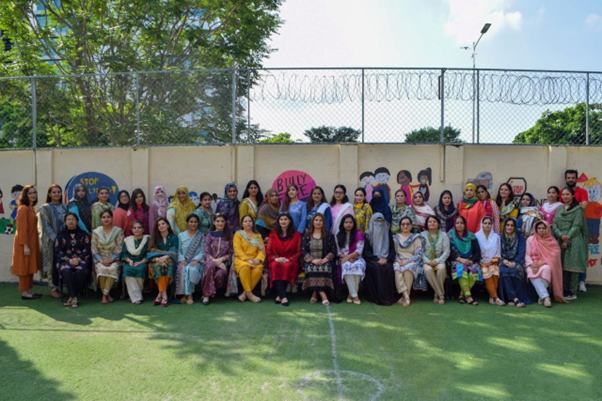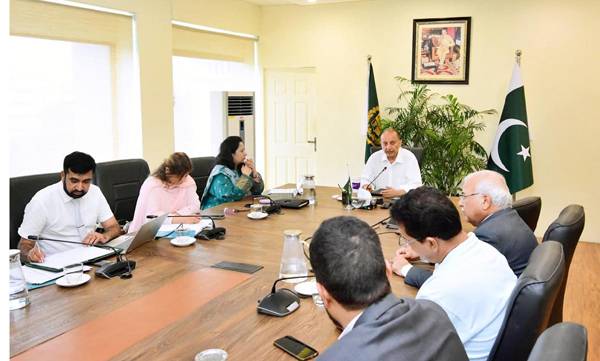

The Chairman Senate appreciated the Higher Education Commission (HEC), National Academy of Higher Education (NAHE), and Higher Education Development in Pakistan (HEDP) for creating and strengthening the culture of capacity building of higher education institutions.
HEC organised a flagship conference on Wednesday entitled Faculty Leadership & Management Excellence (FLAME) 2025 to showcase the success of the National Outreach Program (NOP), a capacity-building initiative executed by the National Academy of Higher Education (NAHE) in 85 public sector universities. Over 4,000 faculty and management staff members have benefited from the program.
Chairman Senate Syed Yusuf Raza Gilani graced the closing ceremony of the conference as the chief guest, whereas Federal Minister for Federal Education and Professional Training Mr. Khalid Maqbool Siddiqui honored the opening of the event. Governor Balochistan Sheikh Jaffar Khan Mandokhail also attended the conference alongside a big assembly of Vice Chancellors from across Pakistan, said a press release.
Addressing the conference, the Chairman Senate highlighted the role of academia in nation building, saying that the faculty members are the architects of the future, while the university representatives carry forward the vision and pursuit of progress.
He emphasized the role of education in the development of a nation, stating that education is the foundation upon which nations are built.
He underlined that the nation must proceed with unity of purpose, courage in leadership, and faith in the transformative power of education.
He also lauded NAHE’s Women Empowerment and Mentorship Programme (WEMP), stating that Pakistan cannot reach its full potential until all women have access to playing their part in the country’s socio-economic development.
“Women Empowerment and Mentorship Programme is very close to my heart,” he added.
Federal Minister Mr. Khalid Maqbool Siddiqui expressed his pleasure at being part of FLAME-2025.
He underlined that an education system aligned with the prevailing and future needs of the nation is a need of the hour.
He also highlighted the importance of skill-based education in the socio-economic development of the country.
In his address, Governor Balochistan, Mr. Mandokhail, said that the university leadership and faculty are the torch-bearers of excellence, adding that initiatives like FLAME-2025 are pivotal to achieving teaching excellence and administrative effectiveness.
Chairman HEC Dr. Mukhtar Ahmed emphasized that the survival of Pakistan lies in reaching excellence in education, research, and innovation.
He stressed the need for making significant investments in higher education to enable the educational institutions to play a more effective role in the development of Pakistan.
He stated that the youth of Pakistan have great potential that needs to be tapped.
He underlined that the Pakistani youth who graduated from the local universities are playing a pivotal role in the development of this country.
He noted that there is a sheer need for qualified faculty around the world.
Project Coordinator HEDP, Awais Ahmad, said that the National Outreach Programme is a critical component of the HEDP, as it focuses on strengthening faculty expertise and effective academic management and directly supports national goals of innovation, quality, and competitiveness.
He also shed light on the objectives of HEDP to enhance the quality and capacity of Pakistan’s higher education sector.
The conference paid tribute to the module developers, trainers, and mentors, and the universities for their contributions to making the National Outreach Programme a success, while congratulating the programme beneficiaries.
During the conference, detailed plenaries were held on ‘Empowering Faculty and Management Leadership through Professional Development’ and ‘Women’s Empowerment in Higher Education’. Renowned academic leaders and academicians shared their thoughtful insights.
The panelists of the first plenary appreciated the outcomes achieved under the National Outreach Programme and stressed the need for continuity of capacity-building initiatives for sustainable outcomes.
They admired NAHE for developing well-structured modules and effectively executing them across the universities.
They were of the view that the growth of faculty and staff through such training will strengthen the universities and will lead to having quality graduates.
The panelists of the second plenary shared experiences of their respective universities with regard to the execution of WEMP.
They expressed their views in support of the NAHE programme WEMP, highlighting that the programme has brought about a huge change, built up confidence of faculty, and nurtured mutual understanding among the faculty members from around the university countrywide.
They emphasized the need for the sustainability of this programme at both the HEC and university levels.
The panelists of the two plenaries also drafted and presented their recommendations in view of the experience and outcomes of the NAHE programme.
Managing Director NAHE Dr. Noor Amna Malik concluded the conference with a vote of thanks to the participants while acknowledging the contribution of the NAHE team, module developers, and universities in the success of the National Outreach Programme. She stated that the National Outreach Programme brought a remarkable change in the ecosystem.
It is pertinent to mention here that NAHE designed the flagship initiative of the National Outreach Program under Higher Education Development in Pakistan (HEDP). The program aimed at bringing high-quality professional development directly to university campuses across Pakistan, ensuring accessibility and impact.
Under two sub-components of the program, viz. National Outreach Program for Faculty and Capacity Building of University Management, NAHE, conducted a total of 66 faculty training programs and 45 management training programs, in addition to holding a three-month pilot mentorship program in 18 women’s universities under the Women Empowerment and Mentorship Program (WEMP). As many as 71 public sector universities hosted a four-week Tier-I faculty training program for Lecturers and Assistant Professors, while 50 universities conducted a five-day management training program for early career officers, including Assistant Registrars, Controllers, and Treasurers.








